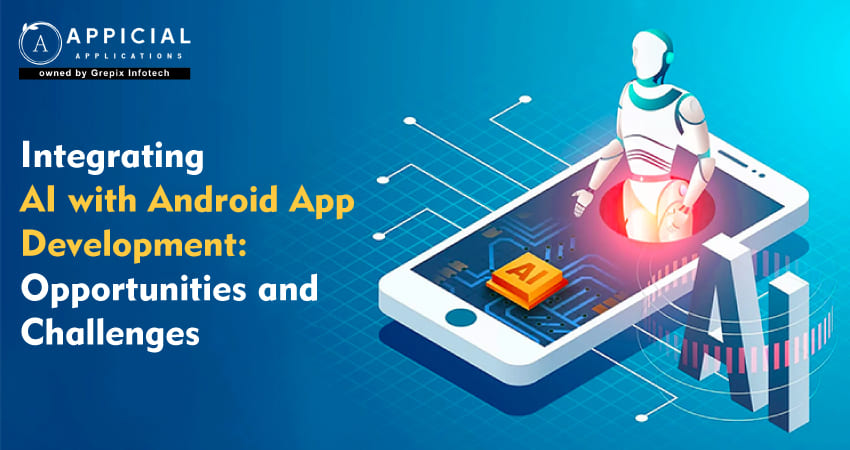
Integrating AI with Android App Development: Opportunities and Challenges
In the dynamic realm of mobile technology, the convergence of Artificial Intelligence (AI) and Android app development represents a pivotal evolution, promising to redefine the boundaries of user interaction, functionality, and personalization. As Android continues to dominate the global smartphone market, the integration of AI within its ecosystem is not just an option but a necessity for developers aiming to stay at the forefront of innovation. This integration, however, is not without its complexities. It brings a spectrum of transformative opportunities along with a set of significant challenges that developers must skillfully navigate. This blog delves into these dual aspects of AI integration into Android app development, exploring how developers can harness the power of AI to create more intuitive, efficient, and engaging apps, while also addressing the technical, ethical, and operational challenges they face in this ambitious endeavor.
The integration of Artificial Intelligence (AI) with Android app development is revolutionizing the mobile technology landscape, offering substantial opportunities for enhancing app functionality and user personalization. AI technologies enable Android apps to provide personalized content, improve user engagement through interactive features, and optimize app operations. However, this integration comes with significant challenges, including data privacy concerns, resource constraints, and ethical issues like algorithmic bias. Despite these hurdles, the potential for AI to transform app development is immense, prompting developers to continually innovate and address these challenges to create smarter, more responsive apps tailored to user needs.
Opportunities in AI-Enhanced Android App Development
1. Personalization at Scale
One of the most significant advantages of AI is its ability to learn from user interactions and behaviors. Android apps powered by AI can deliver personalized content, recommendations, and notifications based on the individual preferences and habits of users. For example, music streaming apps like Spotify use AI to analyze listening habits and create custom playlists for individual users.
2. Improved User Engagement
AI can significantly boost user engagement. By implementing features like predictive text, voice recognition, and intelligent assistants, Android apps can offer a more interactive and accessible user experience. Google Assistant, an AI-driven feature integrated into Android devices, allows users to interact with their phones and apps through voice commands, making the technology more engaging and user-friendly.
3. Enhanced Visual Experiences
AI is also revolutionizing the visual experience of Android apps through technologies like computer vision. Apps can now recognize and interpret images and videos in real-time, leading to innovative features such as real-time language translation in travel apps or advanced photo editing capabilities in apps like Adobe Photoshop Camera.
4. Optimization of Operations
AI enables Android apps to optimize operations and reduce manual input. For instance, AI can automate routine tasks, predict system failures, or optimize battery usage based on user patterns. This not only enhances the performance of the app but also improves device efficiency.
5. Smart Health Monitoring
With the advent of wearable technology, AI-integrated Android apps can monitor health metrics such as heart rate, sleep patterns, and physical activity. Apps like Google Fit use AI to provide customized health advice and fitness strategies, transforming ordinary smartphones into personal health advisors.
Also Read: From Concept to Launch: The Complete Android App Development Journey
Challenges of AI Integration in Android App Development
1. Data Privacy and Security
Integrating AI into Android apps often requires access to large volumes of personal data. Ensuring the privacy and security of this data is a significant challenge. Developers must adhere to stringent data protection regulations, such as GDPR, and implement robust security measures to protect user data from breaches and leaks.
2. Resource Constraints
AI models, particularly those involving complex algorithms and large data sets, require substantial computational power. Android developers must optimize AI integration to ensure that it does not degrade the performance of the app or the overall user experience, especially on devices with limited resources.
3. Complexity of Development
Developing AI-powered features can be complex and time-consuming. Developers need a deep understanding of machine learning algorithms and must be proficient in AI-specific programming languages and tools. This complexity can increase development time and costs, posing a challenge for smaller development teams or individual developers.
4. Ethical Concerns
As AI becomes more prevalent in Android apps, ethical concerns such as bias in AI algorithms and the potential for misuse of AI features become more prominent. Developers must ensure that their AI implementations do not inadvertently propagate biases or facilitate unethical behavior.
5. Integration with Existing Systems
Integrating AI into existing Android apps can be challenging. It requires a seamless integration of new AI components with the existing app architecture without disrupting current functionalities. This often requires significant refactoring and testing, adding to the complexity and cost of development.
Conclusion
The integration of AI into Android app development holds immense potential for transforming app functionalities and user experiences. As we look towards the future of mobile applications, it is clear that the integration of Artificial Intelligence (AI) with Android app development is not just a trend but a transformative shift that is reshaping how we conceive and interact with mobile technology. At Appicial Applications, we are committed to staying at the vanguard of this evolution, continuously exploring innovative ways to leverage AI to enhance app functionality, personalize user experiences, and streamline operations.
We recognize that the path to integrating AI involves navigating complex challenges, from ensuring robust data security and privacy protections to optimizing resource usage without compromising app performance. Our dedicated team of developers and AI specialists are equipped with the expertise and tools to tackle these challenges head-on, ensuring that we not only meet but exceed the expectations of our users and stakeholders.
As we forge ahead, our focus remains on harnessing the full potential of AI to deliver Android applications that are not only technologically advanced but also ethical and user-centric. We invite our clients, partners, and the tech community to join us in embracing the opportunities presented by AI, as we continue to innovate and drive forward the future of Android app development. Together, we are setting new standards in the industry, creating apps that are smarter, more responsive, and more attuned to the needs of users around the globe.
Are you ready to transform your industry with a custom mobile app? Contact us today to see how our innovative solutions can benefit your business.
Launch your vision with our mobile app development company, where innovation meets excellence to create cutting-edge mobile solutions.





